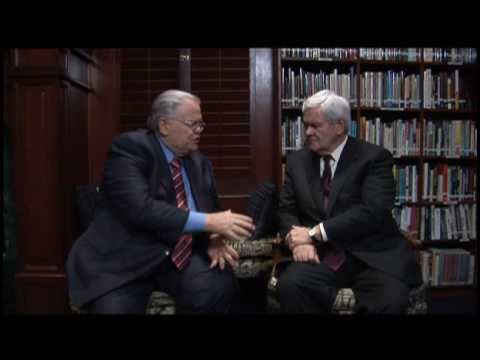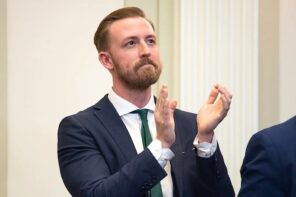Newt Gingrich’s disdain for the separation of church and state was most recently on display at the FAMiLY Leader’s Thanksgiving Family Forum, where the now-frontrunner told the Iowa church audience, “A country that has been now since 1963 relentlessly in the courts driving God out of public life shouldn’t be surprised at all the problems we have.” He was referring, of course, to the U.S. Supreme Court decisions holding officially sanctioned prayer and Bible reading in public schools unconstitutional. “We’ve in fact attempted to create a secular country,” said Gingrich, “which I think is frankly a nightmare.”
His efforts, it should be noted, are getting a mixed reception among Iowa evangelicals.
But Gingrich’s politically expedient antipathy toward a secular democracy is nothing new, nor is his pandering to religious right figures to win elections. Here’s a look back at the greatest hits of Gingrich’s career in opposition to the separation of church and state:
1. Failed school prayer amendment. Rob Boston, senior policy analyst at Americans United for the Separation of Church and State, was at the Heritage Foundation in 1994 when Gingrichd announced his push for a school prayer amendment. “He wasn’t speaker yet,” Boston told me, “but all of the polls showed that the Democrats were headed for shellacking, and many analysts interpreted the announcement as one last effort to rally the religious right voting bloc.”
At that announcement, Boston later wrote in the November 1994 issue of Church and State magazine, Gingrich called the 1963 Supreme Court school prayer decision “bad law, bad history and bad culture.”* He lauded David Barton’s book, The Myth of Separation, calling it “most useful” and “wonderful.” He insisted that there needed to be a full debate “over secularism versus the right of a spiritual life.” Foreshadowing his more recent pronouncements on American execeptionalism, Gingrich stated that “to be an American is to be aware that our power comes from a Creator.” (This was around the time that he began having an extramarital affair with his current wife, Callista.)
But the amendment obviously didn’t mean all that much to Gingrich. According to Boston, “Once in power, Newt promptly began serving his corporate masters and handed the school prayer project off” to Rep. Ernest Istook. But Istook, Boston added, “aided and abetted by religious right groups, overreached and drew up a monstrosity called the ‘Religious Freedom Amendment,'” which “went beyond school prayer and would have also guaranteed religious groups access to tax money and allowed the placement of religious symbols on government property.” Although the amendment won a majority vote in 1998, it fell short of the two-thirds majority required for constitutional amendments.
2. Public Ten Commandments displays. In 2005, Gingrich called Supreme Court decisions on public displays of the Ten Commandments “hysterically schizophrenic and utterly indefensible.” You “can’t find a single line in the Constitution on secularism,” he insisted to an American Enterprise Institute audience, and called the court system “utterly, incomprehensibly out of touch with America.”
That same year, during a promotional tour for his book, Winning the Future: The 21st Century Contract with America, Gingrich called for judges who didn’t understand his religious view of America to be purged from the bench. He told John Lofton, host of the American View, a Christian reconstructionist-oriented radio program, that “I would have sided with Judge Moore.” That is, Gingrich expressed support for the former Alabama Supreme Court justice who lost his seat on the bench for defying a federal court order to remove a 2.6-ton monument of the Ten Commandments from his courthouse.
Gingrich agreed with Lofton that the federal court’s ruling was wrong, but also maintained that Moore should have appealed to Congress. Which was odd given that Gingrich went on to say that Washington “elites” wouldn’t have listened anyway:
The elites in Washington find it extremely difficult, at least between New York and Los Angeles, to talk about the role of our Creator in defining America. And I think all of the secondary arguments — Judge Moore’s arguments, for example — come from winning this argument: That is historically false, to suggest that you can describe America as a society whose rights come from any place other than God. Now, as an atheist, you can make that argument but you cannot make it historically.
3. “Judeo-Christian heritage” vs. “secular socialism.” Gingrich’s book, Rediscovering God in America, co-written with his wife Callista, first published in 2006, became the basis for his speeches at Pastors’ Policy Briefings, the purpose of which were to mobilize “pastors and pews to restore America to her Judeo-Christian heritage.” It was at these meetings that the idea for Gingrich’s organization Renewing American Leadership was hatched. When Barton, who serves on ReAL’s board, appeared on Glenn Beck’s program last year, the organization boasted that “David’s appearance builds on the mission of ReAL. We work to protect our God-given freedoms in Washington, D.C. and around the country. Educating Americans is critical to preserving those freedoms and spreading the truth about our Judeo-Christian heritage.” (ReAL was a Gingrich self-reinvention, which followed an earlier reinvention effort, American Solutions.) The current chair of ReAL is California pastor Jim Garlow, a veteran of the Proposition 8 wars, and who, like Gingrich, claims to also be a historian. At Rick Perry’s August The Response, Garlow said the event was not about whether Perry became president, but rather “about making Jesus king.”
To contrast his “godliness” to that of President Obama’s, Gingrich has claimed that the Obama administration is a “secular, socialist regime” and “the most radical administration in U.S. history.” Just today, Gingrich maintained that the Occupy movement is “un-American.”
4. Rediscovering “Americanism.”
Obama, Gingrich insists, doesn’t understand the part of the Declaration of Independence, “endowed by our Creator.” What makes us “exceptionalist,” he claims, “is unlike any other country in the world, we say, you are personally sovereign, you loan power to the government, the government is never sovereign and the government doesn’t define your rights, you define the government.” And if you don’t get that, in Gingrich’s mind, you are not a real Christian or a real American.
What does it mean to be American for Gingrich? Here he tells televangelist John Hagee:
5. Taxes Are Unbiblical.
To further connect America’s “godly heritage” with the conservative agenda, Gingrich’s ReAL has endeavored to portray taxes as being in opposition to the Ten Commandments. (And if they’re posted in government buildings, then…)
Dan Gilgoff reported in 2009 that Gingrich’s organization was partnering with the American Family Association — the same group that organized Perry’s The Response — for early efforts to join the Tea Party with the religious right. Gingrich framed his new effort as a question of “religious liberty,” telling Gilgoff, “In the last few years I’ve decided that we’re in a crisis in which the secular state, if allowed, will fundamentally and radically change America against the wishes of most Americans. . . . You’ve had such rising hostility to religious belief that I wanted to reach broadly into the country and dramatically raise public awareness of threats to religious liberty.” Gilgoff reported that ReAL prepared a PowerPoint presentation to show groups like the Chamber of Commerce and Americans for Tax Reform that “politicians with the strongest socially conservative records also have the strongest antitax records.” And as Peter Montgomery reported here, just days after the 2010 midterms, Gingrich, Garlow, and Barton held a conference call with pators at which Garlow and Barton insisted that taxation and deficit spending were violations of the biblical commandment against theft.
Those other commandments? Only a socialist-secularist would question Gingrich about that.
Clarification: The Supreme Court ruled in 1962 that officially sanctioned school prayer was unconstitutional; the 1963 case was on school-sponsored Bible reading. In his speech, Gingrich referred to both. Thanks to Mark Chancey, chair of the Religious Studies department at Southern Methodist University for pointing out this distinction.




